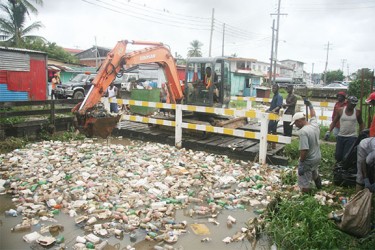Office of the President has criticised the Hydrometeo-rological Office over its failure to provide warnings in a timelier manner ahead of Wednesday’s flash flooding, which left most of the capital under several inches of water and saw millions in damages.
“Hydromet failed us,” the Government Informa-tion Agency (GINA) quoted Head of the Presidential Secretariat Dr Roger Luncheon as saying at his weekly post-Cabinet press briefing at the Office of the President yesterday, even as the Ministry of Public Works embarked on a major exercise to clear blocked drains in the city, especially in the Lodge, Charlestown, Wortman-ville, Albouystown and Queenstown areas, which was blamed for the flooding.
In light of the flash flooding, questions have been raised about the use of the $550 million Doppler Radar project intended to provide up-to-the-minute weather reports and boost the capacity of the Hydromet Office.

The Agriculture Minis-try has said that the heavy rainfall which hit regions 2, 3, 4, 5, 6, 7 and 10 on Wednesday was an unusual occurrence and was due to a high pressure system off Bermuda pushing the Inter-Tropical Convergence Zone closer to Guyana.
In a release issued early yesterday morning, the ministry said that the Hydromet Office recorded rains of intensity between 12 to 20 mm per hour over the Atlantic and a strip of the coast in the area around the adjoining lands of Region 4 and Region 5.
“If this persist[s] we may have accumulation of water as was recorded on November 26 in areas listed,” it stated, while adding that Region 6 may also experience heavy showers. “This intensity is highly abnormal. In 2005 heavy periods of rain averaged about 7 mm per hour,” he added, while noting that given high levels of water in canals, flooding will be expected if rain systems move onto coast, particularly Georgetown.
Meanwhile, GINA reported that the flooding also exposed City Coun-cil’s poor preparedness for such an occurrence and that Luncheon called on residents of Georgetown to let the City Council report on its level of preparedness for this short rainy season, particularly as it relates to drains, pumps and kokers.
He said that while the city’s ability to discharge water from the land could at any time be exceeded, there are some obvious solutions that the Council has, to date, failed to implement.
“The drainage system in the city needs to be fixed,” he said, while adding that desilting must also be done as well as ensuring access to canals whose reserves and borders have been left for squatting.
Luncheon added that there must be a commitment by any incoming City Council to work with residents of South Georgetown to address this issue, while noting that there must be an increase in the mechanical drainage capacity.
“We need more pumps, bigger pumps to deal with these situations. With desilting of major canals, the improvement in gravity drainage can only be supported by fixing and maintaining the kokers that drain into the Demerara River,” Luncheon also said.
With regards to a more comprehensive national flood response, he made reference to an opposition motion for the restoration of Georgetown, which was unanimously adopted in the National Assembly. He assured that the government is committed to work together with all political parties to ensure that systems are put in place to avoid dire flood situations.
‘Three days’ time’
GINA also reported that the clean-up of the city’s drains undertaken by the Works Ministry yesterday saw the clearing of blockages and removal of vegetation and garbage from the heavily blocked drainage canals.
Public Works Minister Robeson Benn, who was on site at Sussex Street during the exercise, was quoted as saying that the ministry had four emergency teams working in particular areas of South Georgetown.
“It’s an additional effort because we have so much of vegetation and garbage all over the city …barring not much more rain, we anticipate that we will get those areas drained out in three days’ time,” he said. He said that the ministry has installed pumps in Queenstown and Lodge, and it was anticipated that more pumps would be installed.
Benn added that the ministry will be obtaining two long reach excavators to assist in alleviating the drainage problems in the city, and will be engaging persons to remove impediments, especially scrap iron that will cause any obstruction to clearing of the drains.
This, he said, complements what the Ministry of Local Government and Regional development is doing to address the issue of solid waste in the city.








